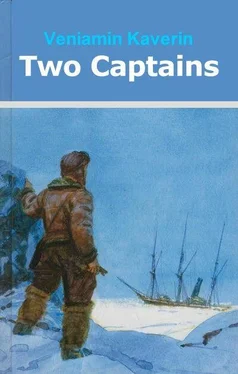I did not get back to my regiment until the end of January, and the very next day I was summoned to Polarnoye to report to the commander of the Northern Fleet.
Our launch entered the bay, and the town unfolded to my gaze, all white, pink and snowy. It stood on the steep, grey hillside as if on a pedestal of beautiful granite rocks. White little houses with porch steps running out in different directions were arranged in terraces, while along the bay front, forming a semi-circle, stood big stone houses. In fact, as I found out afterwards, they were called "compass houses", as though a gigantic compass had described this semi-circle over Catherine's Bay.
I climbed the flight of steps which passed under an arch thrown between these houses and saw the whole bay from shore to shore. The inexplicable agitation under which I had been labouring all that morning gripped me anew with extraordinary farce. The bay was dark green and impenetrable, with only a faint glimmer shed by the sky. There was something very remote, southern, reminiscent of a highland lake in the Caucasus, about this land-locked bay-except that on the far side a line of low hills, covered with snow, ran out into the distance with low trees making here and there a delicate black tracery against their dazzling background.
I do not believe in intuition, but that was the word that sprung to my mind as, stirred by the beauty of Polarnoye and Catherine's Bay, I stood by the compass houses. It was as if the town that appeared before me were my home, which until then I had only seen in dreams and sought in vain for so many long years. I found myself thinking with a thrill of excitement that something was bound to happen here, something good for me, perhaps the best thing to happen to me in all my life.
There was nobody at HQ yet. I had come before office hours. The night-duty officer said that, as far as he knew, I had been ordered to report at 10 p.m., whereas it was now only seven-thirty.
I went to look up the doctor-not at the hospital, but in his rooms.
Of course, he lived in one of those white little houses arranged in terraces on the hillside. They had looked much prettier from the sea. Here was Row One, but I needed Row Five, House No. 7.
Like the Nentsi, I walked along thinking all but aloud of what I was seeing. A group of Englishmen overtook me. They wore funny winter caps resembling those our old Russian coachmen used to wear and long, khaki robe-like affairs and it set me thinking how little they knew our Russian winters. A boy in a white fluffy fur coat walked along, grave and chubby, with a toy spade over his shoulder. A be-whiskered sailor caught him up and carried him on a few steps, and it set me thinking that there were probably very few children in Polarnoye.
House No. 7, Row 5, differed in no way from any of its neighbours on the right or left, except perhaps that its front steps were barely visible under a coating of slippery ice. I took them at a run and collided with some naval men, who came out onto the porch at that moment. One of them slid carefully down the steps, remarking that "inability to take one's bearings in a Polar-night situation points to a deficiency of vitamins in the body". They were doctors. This was Ivan Ivanovich's home all right.
I went into the hall, pushed one door, then another. Both rooms were empty, smelt of tobacco, had unmade beds in them and things lay scattered about, masculine-like. There was something hospitable about those rooms, as if their occupants have purposely left the doors open.
"Anybody here?"
There was no need to ask. I went out into the street again.
A woman with her skirt hitched up was rubbing her bare feet with snow. I asked her whether this was house No 7.
"Who may you be wanting?"
"Doctor Pavlov."
"I daresay he's still asleep," the woman said. "You go round the house, that's his window over there. Knock hard!"
It would have been simpler to knock at the doctor's door, but I complied nevertheless and walked round to the window. The house stood on a slope and the window at the back stood rather low over the ground. It was covered with hoarfrost, but when I knocked and peered in, shading my eyes with my hand, I thought I saw a shape like a woman's figure. Like a woman bending over a basket or a suitcase. She straightened up when I knocked and came over to the window. She, too, shaded her eyes with her hand, and through the blurred frostwork of the window I saw a blurred face.
The woman's lips stirred. She did nothing, just moved her lips. She was barely visible behind that snowy, misted, murky glass. But I recognised her. It was Katya.
Chapter Three
IT WAS KATYA
How can I describe those first minutes, the speechless rapture with which I gazed into her face, kissed it and gazed again, asked questions only to interrupt myself, because everything I asked about had happened ages ago, and terrible though it was to know how she had suffered and starved, almost to death, in Leningrad, and had given up hope of ever seeing me again, all this was over and done with, and now there she stood before me and I could take her in my arms-God, I could hardly believe it!
She was pale and very thin, and something new had come into her face, which had lost its former severity.
"You've had your hair cut, I see?"
"Yes, a long time ago," she said. "Back in Yaroslavl, when I was ill."
She had not only had her hair cut, she was a different woman. But just now I did not want to think about that-everything was whirling around, the whole world, we, this room, which was an exact replica of those other two, with its things scattered about, with Katya's open suitcase, from which she had been taking something out when I knocked, and the doctor too, who, it appears, had been there all the time, standing in a corner wiping his beard with his handkerchief, and now started to tiptoe out of the room, but I stopped him. But the main thing, the most important thing-Katya was in Polarnoye! How had she come to be in Polarnoye?
"My God, I've been writing to you every day!" she said. "We just missed each other in Moscow. When you called on Valya Zhukov I was queuing for bread in Arbat."
"No?"
"You left him a letter, and I dashed off to look for you-but where? Who could have imagined that you would be going to see Romashov!"
"How do you know I went to see Romashov?"
"I know everything, darling!"
She kissed me. "I'll tell you everything."
And she told me that Vyshimirsky, frightened to death, had sought out Ivan Pavlovich and told him that I had had Romashov
arrested.
"But who's this Rear-Admiral R.?" she said. "I wrote to you, care of him, and then to him personally, but he never answered. Didn't you know that you were coming here? Why did I have to write to you through him?"
"Because I didn't have an address of my own. I left Moscow to look for you."
"Where?"
"At Yaroslavl. I was in Yaroslavl."
"Why didn't you write to Korablev when you came here?"
"I don't know. My God, is it really you? Katya?"
We were walking up and down with our arms round each other, stumbling over things, again and again asking "why?" "why?" and there were as many of these "whys" as there were causes which had parted us at Leningrad, prevented us from running into each other in Moscow, and now thrown us together in Polarnoye, where I had now come for the first time and where only half an hour ago it was impossible to imagine Katya being.
She had heard about my discovery of the expedition from the TASS reports which appeared in the newspapers. She had got in touch with the doctor and he had helped to get a permit to come to Polarnoye. But they did not know where to write to me-even if they did know, it is hardly likely that any mail would reach me at the camp site of Captain Tatarinov's expedition!
Читать дальше












